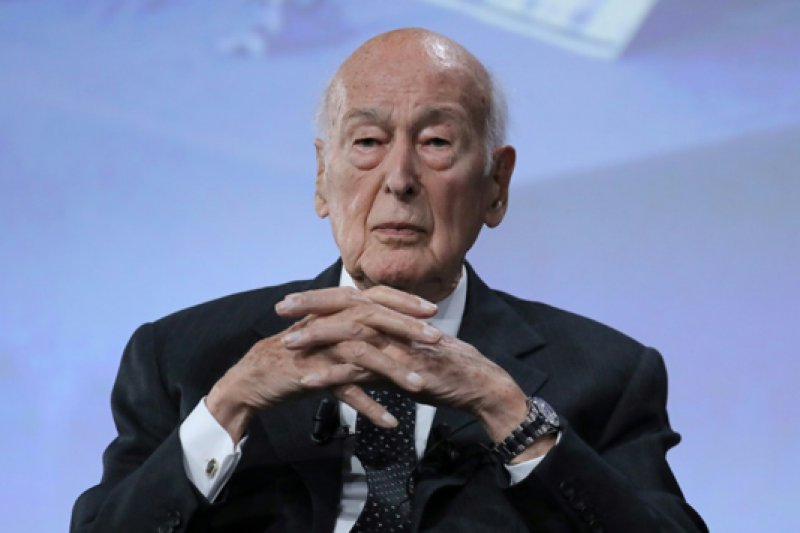France Mourns ex-President, Dead at 94
Valéry Giscard d'Estaing, France's president from 1974 to 1981, has died at the age of 94. He died of complications from coronavirus, surrounded by his family at his estate in central France.
A centre-right, pro-Europe politician, Giscard d'Estaing also liberalised laws on divorce, abortion and contraception during his seven years in power. President Emmanuel Macron said his presidency had transformed France and his direction still guided its way.
"A servant of the state, a politician of progress and freedom, his death has plunged the French nation into mourning," he said in a statement.
The late president's family said his funeral would take place amid "strict intimacy".
Long career in politics
In later life, Giscard d'Estaing liked to portray himself as the grand old man of French politics.
As one of France's youngest presidents - he was 48 when he came to power, he had a longer career in politics after he left high office than he had enjoyed on his way to the Élysée Palace.
He was seen by many as arrogant and aloof; his presidential popularity was short-lived and he was eventually squeezed out of office by a strengthening of opposition from both the left and the right.
He was also caught up in a scandal surrounding his support for a corrupt African dictator.
Valéry Marie René Georges Giscard d'Estaing was born on 2 February 1926 in Koblenz, in what was then French-occupied Germany.
His father was a civil servant who worked for the French occupying forces, while his mother was descended from King Louis XV of France via one of his mistresses.
Giscard d'Estaing's education was disrupted by World War Two. He was just a teenager when he joined a French resistance group in occupied Paris before enlisting in a tank battalion in 1944, earning the Croix de Guerre in the last months of the war.
He worked for a while as a teacher in Montreal before graduating from the Ecole Nationale d'Administration and joining the tax and revenue service.
In 1955 he spent some time on the staff of prime minister Edgar Faure before winning the seat of Puy-de Dome in the National Assembly, the area from which his mother's family came.
He became secretary of state for finances in 1959, a post he held for almost four years until his party broke with the ruling Gaullists with whom they were in a coalition. However, Giscard d'Estaing refused to leave the government and founded the Independent Republicans, which allied itself to the majority Gaullists.
He was sacked from the cabinet in 1966 but, as chairman of the National Assembly committee that scrutinised the country's finances, he remained a powerful voice, latterly increasingly critical of the De Gaulle government.
Thrown out of his chairmanship by the Gaullists in 1968, he gained his revenge by supporting Georges Pompidou in the 1969 presidential elections, whereupon he was reappointed to the finance ministry.
When Pompidou died suddenly in 1974, Giscard d'Estaing announced he would run for the Élysée Palace, presenting himself as a modern and moderate alternative to the austere conservatism of Gaullism.
Death sentences
He successfully gained the support of the centre while, at the same time, taking advantage of divisions among the Gaullists, some of whom - notably Jacques Chirac - announced their support for Giscard d'Estaing as the only hope of defeating the left.
Giscard d'Estaing narrowly defeated the socialist François Mitterrand in the second round of voting with just 50.7% of the poll, becoming the third youngest president in French history.
After years of Gaullist stagnation, he made his intentions plain: "You want a deep political, a deep economic and a deep social change. You will not be disappointed," he said.
At home, he made several reforms early on in his term in office. The voting age was lowered from 21 to 18, while divorce and abortion laws were relaxed, in spite of fierce opposition from the Catholic Church.
He also saw through laws on equal pay and opportunities for women, reduced the retirement age to 60 and allowed Paris to elect its own mayor.
Although he voiced his opposition to the death penalty, he refused to commute three of the death sentences passed during his term, and the last use of the guillotine in France took place in 1977.
A fan of technology, Giscard d'Estaing was a strong advocate of the French high-speed train network, the TGV, construction of which began in earnest in 1976.
He was also an enthusiastic supporter of the drive to increase France's dependence on nuclear power, following the oil crisis of 1973.
(Source: BBC)













